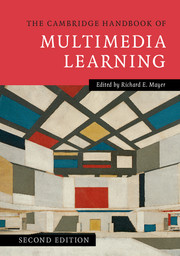Book contents
- The Cambridge Handbook of Multimedia Learning
- The Cambridge Handbook of Multimedia Learning
- Copyright page
- Contents
- Contributors
- Preface
- Acknowledgments
- 1 Introduction to Multimedia Learning
- Part I Theoretical Foundations
- Part II Basic Principles of Multimedia Learning
- Part III Advanced Principles of Multimedia Learning
- 15 The Guided Discovery Learning Principle in Multimedia Learning
- 16 The Worked Examples Principle in Multimedia Learning
- 17 The Self-Explanation Principle in Multimedia Learning
- 18 The Generative Drawing Principle in Multimedia Learning
- 19 The Feedback Principle in Multimedia Learning
- 20 The Multiple Representation Principle in Multimedia Learning
- 21 The Learner Control Principle in Multimedia Learning
- 22 Animation Principles in Multimedia Learning
- 23 The Collaboration Principle in Multimedia Learning
- 24 The Expertise Reversal Principle in Multimedia Learning
- 25 The Individual Differences in Working Memory Capacity Principle in Multimedia Learning
- Part IV Multimedia Learning of Cognitive Processes
- Part V Multimedia Learning in Advanced Computer-Based Contexts
- Author Index
- Subject Index
19 - The Feedback Principle in Multimedia Learning
from Part III - Advanced Principles of Multimedia Learning
Published online by Cambridge University Press: 05 August 2014
- The Cambridge Handbook of Multimedia Learning
- The Cambridge Handbook of Multimedia Learning
- Copyright page
- Contents
- Contributors
- Preface
- Acknowledgments
- 1 Introduction to Multimedia Learning
- Part I Theoretical Foundations
- Part II Basic Principles of Multimedia Learning
- Part III Advanced Principles of Multimedia Learning
- 15 The Guided Discovery Learning Principle in Multimedia Learning
- 16 The Worked Examples Principle in Multimedia Learning
- 17 The Self-Explanation Principle in Multimedia Learning
- 18 The Generative Drawing Principle in Multimedia Learning
- 19 The Feedback Principle in Multimedia Learning
- 20 The Multiple Representation Principle in Multimedia Learning
- 21 The Learner Control Principle in Multimedia Learning
- 22 Animation Principles in Multimedia Learning
- 23 The Collaboration Principle in Multimedia Learning
- 24 The Expertise Reversal Principle in Multimedia Learning
- 25 The Individual Differences in Working Memory Capacity Principle in Multimedia Learning
- Part IV Multimedia Learning of Cognitive Processes
- Part V Multimedia Learning in Advanced Computer-Based Contexts
- Author Index
- Subject Index
Summary
Multimedia learning environments require learners to integrate information across different sources and modalities, which can pose a challenge for some learners. Providing feedback on student responses can be an effective method of guiding learners to achieve a deep understanding of the material. The feedback principle states that novice students learn better with explanatory feedback than with corrective feedback alone. Explanatory feedback provides the learner with a principle-based explanation of why his or her answer was correct or incorrect, whereas corrective feedback merely informs the learner that his or her response was correct or incorrect. The theoretical rationale is that explanatory feedback guides the learner in selecting the appropriate information and consequently reduces the amount of extraneous processing relative to providing only corrective feedback. This chapter reviews evidence for the feedback principle and explores some of the boundary conditions.
- Type
- Chapter
- Information
- The Cambridge Handbook of Multimedia Learning , pp. 449 - 463Publisher: Cambridge University PressPrint publication year: 2014
- 41
- Cited by

